|
|
|
Sort Order |
|
|
|
Items / Page
|
|
|
|
|
|
|
| Srl | Item |
| 1 |
ID:
106499
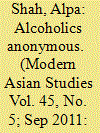

|
|
|
|
|
| Publication |
2011.
|
| Summary/Abstract |
From millenarian movements to the spread of Hindu rightwing militancy, attacks on adivasi (or tribal) consumption of alcohol have gone hand-in-hand with the project of 'civilizing the savage'. Emphasizing the agency and consciousness of adivasi political mobilization, subaltern studies scholarship has historically depicted adivasis as embracing and propelling these reformist measures, marking them as a challenge to the social structure. This paper examines these claims through an analysis of the relationship between alcohol and the spread of the Maoist insurgency in Jharkhand, Eastern India. Similar to other movements of adivasi political mobilization, an anti-drinking campaign is part of the Maoist spread in adivasi areas. This paper makes an argument for focusing on the internal diversity of adivasi political mobilization-in particular intergenerational and gender conflicts-emphasizing the differentiated social meanings of alcohol consumption (and thus of prohibition), as well as the very different attitudes taken by adivasis towards the Maoist campaign. The paper thus questions the binaries of 'sanskritisation' versus adivasis assertion that are prevalent in subaltern studies scholarship, proposing an engagement with adivasi internal politics that could reveal how adivasi political mobilization contains the penetrations of dominant sanskritic values, limitations to those penetrations and other aspirations, such as the desire for particular notions of modernity.
|
|
|
|
|
|
|
|
|
|
|
|
|
|
|
|
| 2 |
ID:
089919


|
|
|
|
|
| Publication |
2009.
|
| Summary/Abstract |
The Union Government took notice of the current phase of the Naxalite challenge with concern, for the first time, in 1998. Since then, it has been playing a coordinating role among the various affected states to address the challenge. It has also been advising the affected states on ways to deal with the challenge. By 2003, the Union Government had put in place a two-pronged approach to address the Maoist challenge - that of a development response and a security response. However, all along, the Union Government's response has largely been security-centric. A political response to the Maoist challenge is, as yet, missing.
|
|
|
|
|
|
|
|
|
|
|
|
|
|
|
|
| 3 |
ID:
157926
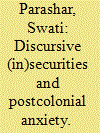

|
|
|
|
|
| Summary/Abstract |
This article queries the intimate relationship between militarism and the state, which is seen as the by-product of ‘postcolonial anxiety’ (Krishna, 1999) related to the survival of the nation-state in the Third World. This anxiety enables militarism at various levels of governance and state interventions in the everyday lives of the citizenry. The article engages with the historical trajectory of the Indian state to argue that its ‘postcolonial anxiety’ engenders militarism not in the immediate aftermath of independence from colonial rule, as in other postcolonial states, but as an anomaly since the end of the Cold War and the advent of globalization. The Indian state rejected militarism immediately after independence, but subsequently used it sporadically to deal with armed insurgencies in the 1970s and 1980s. The popular endorsement of militarism in India coincides with the globalized world order of the 1990s, the move to democratize ‘security’ in discourse and practice, and the adoption of neoliberal developmentalism to ‘catch up’ with the ‘modern’ trajectory of the European nation-states. I argue that this has led to ‘excessive militarism’ that thrives on the shared consensus between the state and citizens that security is a collective enterprise in which the material and affective labour of militarism must be performed by both sides. Citizens embrace military logics and military ethos, both to contest the state’s violence and to confer legitimacy on the state and secure development benefits. The article concludes that militarism opens up new spaces for understanding the complex statebuilding processes of postcolonial societies, the fraught and textured relationship between the state and citizens, and the constant tensions and negotiations between civilian lives and military culture.
|
|
|
|
|
|
|
|
|
|
|
|
|
|
|
|
| 4 |
ID:
155032
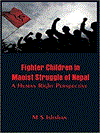

|
|
|
|
|
| Publication |
New Delhi, Alpha Editions, 2017.
|
| Description |
vii, 276p.hbk
|
| Standard Number |
9789386423955
|
|
|
|
|
|
|
|
|
|
|
|
Copies: C:1/I:0,R:0,Q:0
Circulation
| Accession# | Call# | Current Location | Status | Policy | Location |
| 059187 | 335.434505496/ISH 059187 | Main | On Shelf | General | |
|
|
|
|
| 5 |
ID:
054675
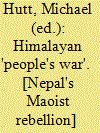

|
|
|
|
|
| Publication |
London, Hurst and Company, 2004.
|
| Description |
xi, 322p.pbk
|
| Standard Number |
185065722X
|
|
|
|
|
|
|
|
|
|
|
|
Copies: C:1/I:0,R:0,Q:0
Circulation
| Accession# | Call# | Current Location | Status | Policy | Location |
| 048858 | 954.96/HUT 048858 | Main | On Shelf | General | |
|
|
|
|
| 6 |
ID:
122584
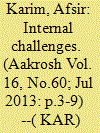

|
|
|
| 7 |
ID:
184067
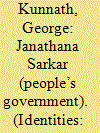

|
|
|
|
|
| Summary/Abstract |
This article focuses on the agency of the poor in the context of rebel governance in rural India. During its five-decade-long armed agrarian struggle, the Maoist movement has established in several villages an alternative structure of governance called Janathana Sarkar (people’s government) with Adivasis and Dalits as the primary agents of social transformation. Drawing on the author’s long-term ethnographic fieldwork in the Maoist guerrilla zones, this article explores the insurgent consciousness of Dalits and Adivasis by engaging with two interrelated questions. First, how does Janathana Sarkar function as a platform for radical democracy by the marginalised? Second, is violence inherent in the emergence and manifestation of this agency? These questions, although primarily focused on the agency of Dalits and Adivasis in Janathana Sarkar, have a wider relevance to the study of transformative politics of the poor and radical democracy, which have received inadequate attention in the scholarship on rebel governance.
|
|
|
|
|
|
|
|
|
|
|
|
|
|
|
|
| 8 |
ID:
082574
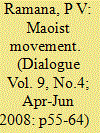

|
|
|
| 9 |
ID:
079862
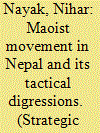

|
|
|
|
|
| Publication |
2007.
|
| Summary/Abstract |
King Gyanendra's takeover of absolute political power in February 2005 paved the way for the Maoists of Nepal and the political parties to fight together for democracy. In signing the 12-point agreement with the Seven Party Alliance (SPA), the Maoists even changed their strategy from a revolutionary agenda to a democratic one. The paper argues that the Maoist departure from the classical resistance model to the path of negotiation was tactical, to overcome the constraints on their way forward. However, the SPA and the Maoists have several issues to settle for making the experiment a success. If this accord fails, Nepal might face a fresh round of conflict and the monarchy might get another chance to dominate the polity.
|
|
|
|
|
|
|
|
|
|
|
|
|
|
|
|
| 10 |
ID:
104734
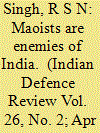

|
|
|
| 11 |
ID:
100245
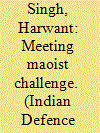

|
|
|
| 12 |
ID:
142410
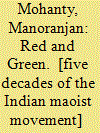

|
|
|
|
|
| Publication |
Kolkata, Setu Prakashani, 2015.
|
| Description |
xviii, 498p.hbk
|
| Standard Number |
9789380677699
|
|
|
|
|
|
|
|
|
|
|
|
Copies: C:1/I:0,R:0,Q:0
Circulation
| Accession# | Call# | Current Location | Status | Policy | Location |
| 058415 | 322.420954/MOH 058415 | Main | On Shelf | General | |
|
|
|
|
| 13 |
ID:
157189
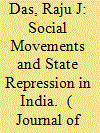

|
|
|
|
|
| Summary/Abstract |
State repression is particularly likely when social movements target property relations that cause ordinary citizens to suffer. Whether these movements are violent, and whether the state is a liberal democracy is a contingent matter. This is illustrated by India’s ‘Maoist movement’ (which is also known as the Naxalite movement because it originated in an area called Naxalbari, located in India’s West Bengal State). Where necessary, sections of this movement use violent methods to fight for justice for aboriginal peoples and peasants. This strategy, which the author, incidentally, does not endorse, has been seen by the state as the greatest internal military threat to it. Such a perception invites state violence. What is often under-emphasized or ignored is that the movement is an economic, political and ideological threat, and not just a military threat, and it is so through its localized alternative developmental activities, and this is also a reason for the state’s violent response to it.
|
|
|
|
|
|
|
|
|
|
|
|
|
|
|
|
| 14 |
ID:
184638
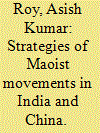

|
|
|
|
|
|
|
|